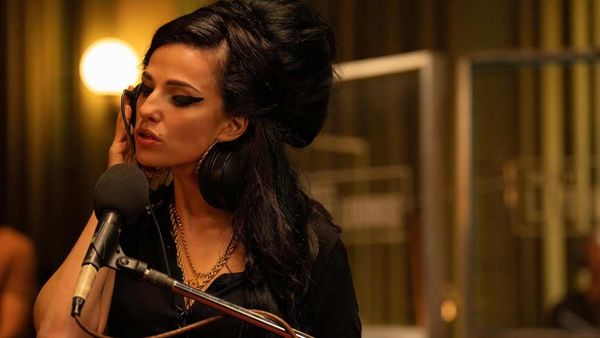April 7, 2012
Evita
Steve Weinstein READ TIME: 5 MIN.
If Ricky Martin is the name bringing the throngs of tourists nightly into the cavernous Marquis Theatre, they'll be nicely surprised by the excellent overall production, highlighted by Rob Ashford's electric choreography.
If Elena Rogers is overly chirpy in the punishing title role, she certainly looks right and, more importantly, inhabits the title role. But it's Michael Cerveris, in the normally overlooked role of the man she helps put into power as caudillo of Argentina, who steals the show.
While this revival of "Evita" didn't exactly turn me into one of the many who believe that this sung-through work is one for the ages, it certainly makes a good case for it.
Even those who dismiss "Evita" as mostly hackwork have to recognize this work, which premiered on Broadway in 1979, as the first of the epic historic mega-musicals that culminated in "Les Miserables" before crashing and burning in expensive failures like "Ragtime" and "The Civil War."
Having visited Buenos Aires a few years ago and experienced first hand the absolute adulation that this woman still inspires, I went to this show with special interest. Lloyd Weber, and especially his librettist, Tim Rice, gloss over many of the facets that have made Eva Peron a continual presence on the Argentine landscape.
The problem lies in the sung-through, opera- (or more, properly, operetta-) like libretto. Singing her way into and through her famous tour of European capitals necessitates simplifying the details, often to the point of obscurity or confusion. Thus, the narrative barely skims Evita's having been shunned by the English King George VI, who refused to receive her at Buckingham Palace (over the strenuous objections of his foreign minister).
Similarly, the essential part of the Evita story -- her welfare projects and feminism -- are also glossed over. This is a shame, because these two aspects of her personality are indeed historically vital. Evita took what had been private charity -- the occasional largesse of the wealthy -- and brought it into the government.
If she began this as a reaction to her rejection by the Argentine society ladies as a pushy arriviste whore, by the end of her life, she had become a devoted and thoroughly efficient dispenser of charity. In essence, she single-handedly created the modern Argentine welfare state.
So, too, her influence not only finally gave women the franchise, but her example also catapulted women to the corridors of power. The current female president of Argentina (herself a neo-Peronist), credits Evita as her role model.
In other words, she dragged an entire nation kicking and screaming into the 20th century. It was her intelligence and political instincts that made her the most important female political figure in Latin America.
So Eva Peron was a lot more than a provincial bastard who, through sheer ambition, became the second-most powerful person in Argentina. Lloyd Webber and Rice underplay this side of her in favor of what is definitely an important aspect of her cult: namely, the way she became the first person to combine celebrity and politics in a way that has since shaped political discourse throughout the world (hardly excepting the U.S.).
Elena Rogers, who shot to stardom starring as "Evita" on the West End, is herself Argentine, which helps explain why she brings such a deep understanding to the role. She is as tiny as the real-life Eva Peron, but boy can she dance, as she proves early, in the really terrific First Act ensemble number "Buenos Aires."
If her chirpy voice may be more suitable to another mid-century cultural touchstone, Edith Piaf (whom she has also played to great acclaim in London), the voice holds up in a role that would run ragged any operatic soprano eight shows a week.
Yes, Mrs. Lincoln, but how was the show? OK, OK, here's what any reader of this site wants to know: How as Ricky Martin? He was pretty good.
If that sounds like guarded praise, it is. The onetime boy-band idol looks as sexy as ever, and he sounds great. It's obvious that, at this point in his career, on a Broadway stage is exactly where he should be, and he knows it. He's at ease and charismatic as all get out.
That said, his gestures are still a bit wobbly. He's either waving his hands around or sticking them deeply into this pocket. Part of the problem is the interpretation: Rather than the out-of-history Ch� Guevara, director Michael Grandage makes him an insouciant boulevardier.
This Ch�, rather than looking at the goings-on around him with revolutionary fervor, has a cynical outlook. It's not a bad way to re-interpret the role, and, if Martin doesn't erase fading memories of Mandy Patinkin's ragged guerrilla (just as Rogers doesn't make one forget Patti Lupone), he gives us a Ch� suitable to our more ironic age.
And when he finally breaks loose in the Second Act and shakes that world-famous booty, the sound you hear is the collective sighs of every gay man and woman in the audience (and there were many of both the night I attended; it's reported that Hispanic women from far and wide are drinking in the wonders of Martin's posterior anatomy).
Michael Cerveris once again proves that he's become one of today's most reliable Broadway singing actors. His Juan Peron is no cartoon cutout; this is a man made of flesh and blood, one who combines an Everyman sexual energy with the relentless ambition of a South American military demi-dictator.
As with the best shows, the choreography doesn't just dress up the action, but rather furthers it, as with the brilliantly staged "The Art of the Possible," a musical-chairs tango in which military officers trip each other until Peron is the last man standing. (Appropriately, there's plenty of tango; but how could an Argentine audience just be standing around during a number like "On This Night of a Thousand Stars"? Trust me: They'd all be arm-in-arm dancing like crazy.)
The ensemble does a great job of realize Ashford's choreography, especially in the "Buenos Aires" number. It's helped by gorgeous costumes and a set that successfully evokes the Paris-inspired monumental architecture of Argentina's capital.
While the music is uneven, there are undoubtedly some beautiful tunes here. As for memorable, don't even dream of getting "Don't Cry for Me Argentina" out of your head. A leitmotif throughout, the song lodges in your brain like Poe's "Tell-Tale Heart."
Like much of the rest of this memorable "Evita," whether you consider it slight or profound, it does what it's supposed to do. It gets under your skin.
"Evita" may be the first show I've seen that uses the barn-like expanse of the Marquis to good effect. It's big, it's loud, it's grand. It's Broadway. In all its excessive glory, it lives up to the larger-than-life figure whose life and death it purports to describe.
Steve Weinstein has been a regular correspondent for the International Herald Tribune, the Advocate, the Village Voice and Out. He has been covering the AIDS crisis since the early '80s, when he began his career. He is the author of "The Q Guide to Fire Island" (Alyson, 2007).







